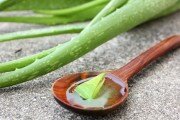Are You Taking St. John’s Wort? Read This Now…
When I read the headline The most popular herbal treatment for depression can be unexpectedly dangerous ?¦ and even deadly, I thought to myself: Here we go again, another attack on natural and alternative medicine.
However, it turns out I was a bit quick to react, because beyond the slightly inflammatory headline, the article was actually very informative. In fact, every person who takes St. John’s Wort, must know about the hidden dangers of this alternative treatment for depression.
Not a good mix
St. John’s Wort – Hypericum perforatum – is a flowering medicinal herb that is sold over-the-counter as a natural treatment for depression. Other names for it include Tipton’s weed, rosin rose, goatweed, chase-devil, or Klamath weed.
In Germany, doctors prescribe St. John’s Wort 7 times more than well-known pharmaceutical antidepressants (like Prozac) that dominate the market in countries like the US. This is mostly down to the fact that St. John’s Wort has minimal side effects and comes at a fraction of the cost in comparison to pharmaceutical drugs.
Despite its brilliant track record, a new study from Wake Forest Baptist Medical Centre is a reminder that this potent herbal treatment can be very dangerous when taken with other medications.
Wake Forest researchers found that St. John’s Wort can alter the concentration and effect of numerous other drugs, including
- Blood thinners
- Chemotherapy
- Contraceptives
- Blood pressure medications
Official statistics show that 1 out of 20 people get a depression diagnosis every year. St. John’s Wort offers a proven alternative to prescription drugs, with none of the unpleasant side effects. This means that many people often self-medicate with St. John’s wort to treat mild-depression.
However, if your doctor is unaware that you are taking St. John’s Wort, he or she won’t be able to warn you against these drug interactions… and that’s where the real danger lies especially if you are taking one of the medications mentioned above.
The Wake Forest research team recommends training doctors to ask patients about any supplements, vitamins, minerals, or herbs they are taking. In the meantime, take your health into your own hands. Tell all your health care providers about any complementary health approaches you use.
Did you find this information useful?
Then why not get more expert health recommendations just like this delivered direct to your inbox?
"It is truly refreshing to read a newsletter on the topic of alternative medicine which is scientifically based and reviewed by professionals..." - Robert Sinott
We respect your privacy and will never share your details with anyone else.Bear in mind all the material in this email alert is provided for information purposes only. We are not addressing anyone’s personal situation. Please consult with your own physician before acting on any recommendations contained herein.
Sources:
The Dangers of St. John’s Wart, published online undergroundhealthreporter.com










